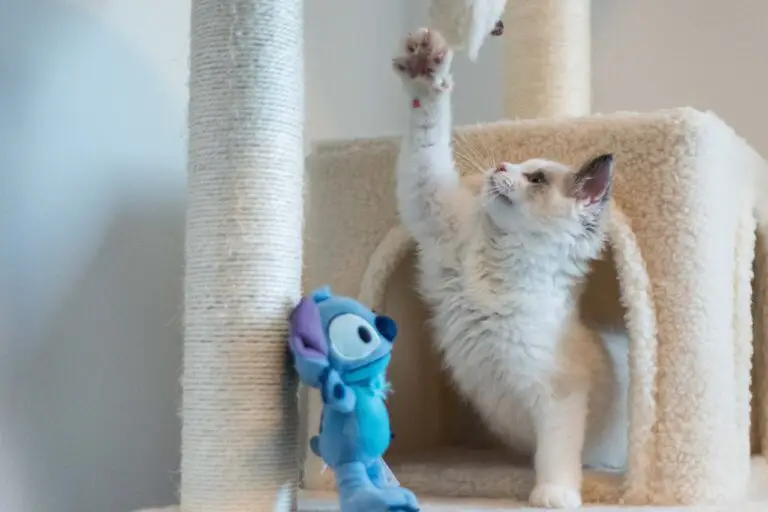Can Cats Get Colds?
While it’s probably the most common viral infection in human beings, a cold (or what your doctor probably calls a rhinovirus) can really take the wind out of your sails. Between the terrible stuffy nose, extreme lethargy, and cough, a cold is nothing to sneeze at!
Unfortunately, our furry feline friends can also suffer from a similar virus, though it’s not the same one that infects human beings.
Recognizing the signs of a feline cold, knowing how to treat it, and learning how to prevent it from spreading to the rest of your cats (if you have more than one) is important information for every conscientious cat owner to have.
In this article we’ll cover the following:
- Can Cats Get Colds?
- Symptoms of a Cat Cold
- How Do Cats Catch Colds?
- Can Cats Catch Colds From Humans?
- Can Kittens Get Colds?
- How To Treat a Cat Cold
Can Cats Get Colds?
Yes, unfortunately for our feline friends they are just as susceptible to catching a cold as humans are.
In cats, the following common viruses often cause cold-like symptoms: feline viral rhinopneumonitis (FVR), rhinotracheitis virus, and feline herpesvirus type 1 (FHV-1). There are many different kinds of viruses and sicknesses that kittens can carry and transfer, such as pink eye and parvo virus.
All of the above can cause respiratory and pulmonary symptoms in cats, including a stuffy nose, coughing, watery eyes, sneezing, and general discomfort.
While these viruses are very contagious to other cats, don’t worry about catching it yourself. The virus strains that infect cats aren’t contagious for human beings, dogs, or other animals.
Symptoms of a Cat Cold
A cold is certainly unpleasant, even for our furry friends. But how do you know if what your cat has is just a cold or something more serious?
Some common symptoms of a feline rhinovirus are:
- Sneezing
- Runny nose
- Coughing
- Wheezing
- Difficulty breathing
- Mouth sores
- Lethargy
- Redness in the eyes
- Watery eyes
Just like with human beings, there isn’t really a “cure” for the common kitty cold. While it’s a smart idea to take your cat to the vet if the symptoms last more than a few days or are particularly severe, sometimes the best thing to do is to let the virus run it’s course and keep your cat comfortable.
Keeping your cat’s eyes, nose, and mouth clear is the first step to making them feel a little better. You can dip a cotton ball in warm water and gently clean their eyes and nose of any excess discharge.
If your cat shows any signs of lethargy, change of appetite, or begins to wheeze or cough excessively, you should take them to the vet right away.
Your vet may prescribe antibiotics, a nasal spray, or some other type of prescription medication to help your cat recover from their cold more quickly.
While some allergy medications such as Zyrtec can be safe for cats if given in the correct doses with the supervision of a veterinarian, it’s very important not to give your cat any human cold medicine, as this can be extremely dangerous and may even kill them!
How Do Cats Catch Colds?
Just like with human beings, cats primarily catch colds from one another.
Even though cats are pretty independent creatures, they have a tendency to sleep together, snuggle with each other, and often share the same water and food bowls. Some cats will even groom one another. All of these types of physical contact are perfect for spreading germs and viruses.
That’s why it’s important to be especially vigilant if you have more than one cat. If one of your cats comes down with a cold, it’s likely that the others will follow suit unless you take action.
You should isolate and quarantine the sick cat from the others to prevent the spread of germs. Make sure to feed them from separate dishes, wash the water bowls frequently with hot, soapy water, and offer them the use of separate litter boxes.
Can Cats Catch Colds From Humans?
Yes. While you can’t catch a cold from your cat, our cats can definitely catch some strains of a cold from us.
While it seems a little difficult to believe, the problem lies in the similarities between the way the cold virus reacts to both humans and cats. The virus attaches itself to the cells in your cat’s respiratory tract the same way it attaches to the cells in your body.
So while you don’t have to worry about catching a cold from your cat, you should worry about potentially passing something on to them.
While nothing sounds better than snuggling up with a cat on the couch when we’re sick, you might want to avoid too much physical contact with your cat while you recover. If you absolutely can’t resist petting them, be sure to wash your hands thoroughly and frequently and avoid touching your cat’s face.
This cat is having a bit of a sneezing fit… Good thing he’s off to the vet!
Can Kittens Get Colds?
Yes, and they can be extremely dangerous for young kittens, so you should absolutely take them to the vet at the first sign that something is wrong.
While a cold is usually a minor annoyance for human beings and adult cats, something as simple as an upper respiratory infection in a kitten can be deadly.
The symptoms of a cold in kittens are similar to the symptoms in adult cats:
- Sneezing
- Coughing
- Lethargy
- Discharge from the eyes and nose
- Fever
Kittens in general are more susceptible to falling victim to viruses because of their age, size, and immature immune symptoms. Because of this, a simple rhinovirus can quickly evolve into a much more serious infection, such as pneumonia or bronchitis, which are both extremely dangerous for a growing kitten.
But the real danger lies in a kitten’s stuffy nose. If a very young kitten is unable to smell (a common side effect of being all clogged up), they may lose their appetite and simply stop eating and drinking, which can be extremely dangerous and can even lead to death.
While you may simply be able to keep an eye on your adult cat if they catch a cold and monitor them for worsening symptoms, it’s important to take immediate action if your kitten catches a cold.
Take your kitten to the vet immediately so they can prescribe medication to ease your kitten’s symptoms. Then, if you have more than one kitten, be sure to isolate the sick kitten from the others so they don’t inadvertently infect them.
Check out this video which can help you identify the symptoms of a cold in kittens! Recognizing the signs could help you save your kitten’s life.
How To Treat a Cat Cold
Treating your cat’s cold may remind you of what you do to take care of yourself when you come down with a virus.
While the first thing you should do is take your cat to the vet if their symptoms are severe, sometimes a trip to the vet isn’t necessary.
If the infection is viral rather than bacterial, there is precious little your vet can do as far as antibiotics. While they may be able to prescribe an antihistamine to alleviate your cat’s symptoms, sometimes giving your cat medication is overkill.
If your cat is suffering from a mild cold, you can treat them in a similar way you would treat yourself (minus the cold medicine, of course). If you’re sure that your cat simply has a common cold, you should do the following to keep them comfortable while they recover:
- Invest in a humidifier if you don’t already have one. Not only can they help you feel better when you get a cold, the moist air will do wonders in improving your cats breathing function and comfort level. A small humidifier, such as this one, is a natural way to help your cat feel and breathe better.
- Keep their eyes and nose clear of excess mucus and discharge. Simply wetting a cotton ball and gently cleaning their eyes and nose will make a world of difference.
- Keep them warm and snug in a cat bed, like the Aspen Self Warming Bed, and try to limit their physical activity if possible.
- Offer your cat plenty of fresh water and food, and visit the vet immediately if you notice they aren’t eating or drinking.
A feline cold will usually only last a few days. If your cat is sick for more than a few days, you should consider bringing them to the vet to make sure it isn’t something more serious.
If you notice any of these symptoms, bring your cat to the vet no matter how long they last:
- Extreme lethargy
- Lack of interest in water or food
- A fever (remember that a cats normal body temperature is between 100.5-102.5 degrees Fahrenheit)
- An excessive cough or wheezing sound
- Trouble breathing
- Unusual litter box habits
If your cat is under one year of age, bring them to the vet at the first sign of a cold. Kittens are especially susceptible to viruses and a simple cold could morph into a severe infection very quickly. It’s always better to be safe than sorry!
So, can cats get colds?
Yes, they can, and it’s actually pretty common. Because colds are so easily transferable between felines (and occasionally we can accidentally infect our cat with a cold as well) it’s pretty likely that your cat will contract a cold at some point during their life.
Luckily, in healthy adult cats, a cold is usually not serious. Keeping them warm, using a humidifier such as this one, and keeping their nose and eyes clear of any gunk will all go a long way in keeping your cat comfortable while they recover.
If you notice your cat’s symptoms worsening, they stop eating or drinking, or they spike a fever you should bring them to the veterinarian right away to make sure it isn’t something more serious.
As always, you should be especially cautious with kittens. Because their immune systems are still developing, a simple cold could transform into pneumonia or other respiratory illnesses that can be deadly to young kittens.
Did your cat catch a cold this winter? How long did it last, and how did you help them to feel better? Did you ultimately have to bring them to the vet? Let us know in the comments!






